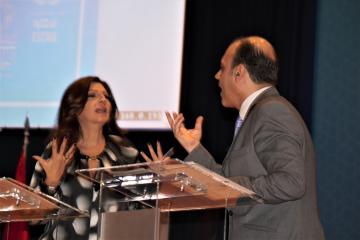
Beirut, 18 December 2018 (Communication and Information Unit)--Arabic Language Day was a special occasion at the United Nations Economic and Social Commission for Western Asia (ESCWA), marked with poetry, prose and dictation that evoked the charm of the Arabic language.
On 14 December 2018, diplomats, academics, students and linguists came together as enthusiasts to enjoy verbal and written gems proffered by the Arabic language.
In perfect harmony, prominent media anchors Lina Doughan and Bassam Barak recited emotive poems by prominent Arab bards, namely Said Akl, Nizar Qabbani, Muhammad al-Maghut, Bechara El-Khoury, Mahmoud Darwish, Ounsi el-Hajj, the Rahbani brothers and Gibran Khalil Gibran. It was a transcendental moment that left the audience speechless.
Mr. Barak then dictated to participants a revised statement delivered by Ghassan Tueni, former Permanent Representative of Lebanon to the United Nations, at the General Assembly in 1982, containing an emotional plea: "Let my people live!". The text highlighted the beauty, complexity, intricacy, mystery and fluidity of the Arabic language, and reconfirmed the pertinence and perpetuity of the message therein for the Arab region. Participants marked their dictation and cheerfully discussed their mistakes.
The Acting Executive Secretary of ESCWA Mr. Mounir Tabet made a touching statement on his love for the Arabic language, despite the suffering inflicted on him by teachers in his childhood. He had rekindled his affection by listening to and reading the works of literary greats, and through his longing to reconnect with his roots.
The Chief of the ESCWA Conference Services Section Ms. Nidale Noun said: “Nations are rightfully shaken when a pen falls silent. They depend on those voices of reason to remind themselves of their written heritage that serves as a solid foundation for the future, of their old cities as motivation for resilience and persistence, of their language, the Arabic language, as a window to wonders”.
The representative of the ESCWA Staff Council announced that it would be holding Arabic language training sessions, in collaboration with the Human Resources Management Section. She urged non-Arabic speakers to benefit from the training to learn a language that would bring them closer to the region where they lived, worked and endeavoured to achieve sustainable development, and which in turn was in need of their efforts and expertise.
Arabic Language Day is observed annually on18 December, the day the General Assembly approved Arabic as an official United Nations language in 1973.
Participants left the event in the hope of meeting again to celebrate a rich language in the heart of an international organization that has committed itself to multilingualism as a foundation for cultural and intellectual diversity towards a peaceful tomorrow.
For more information:
Nabil Abu-Dargham, Head, ESCWA Communication and Information Unit
+961-70-993-144; email: dargham@un.org
Ms Rania Harb +961-70-008-879; email: harb1@un.org
Ms Mirna Mahfouz: +961-70-827-372; email: mahfouz@un.org





